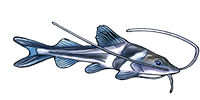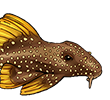Setting up a 125 for cats
Setting up a 125 for cats
I'm looking at a 125 gal. tank with a
Tidepool system of filtration. Up to this
point the biggest tank I've run is a 65 gal.,
with biowheel/powerhead filtration plus
undergravel filter.
The tank will be for my bigger cats. Does
anyone have words of wisdom before I set
this tank up? Things to avoid? Things to
implement? Substrate?
Thanks -
Kathy S
Tidepool system of filtration. Up to this
point the biggest tank I've run is a 65 gal.,
with biowheel/powerhead filtration plus
undergravel filter.
The tank will be for my bigger cats. Does
anyone have words of wisdom before I set
this tank up? Things to avoid? Things to
implement? Substrate?
Thanks -
Kathy S
"Animals without backbones hid from each other or fell down."
125 gal.
To quote the literature:
"Tidepool provides complete wet/dry bio filtration
plus mechanical and chemical filtration . . .
Comes with a large bio-wheel and carbon pillow pad . . .
Self-contained sump accommodates ... water pump
or a heater . . ."
This tank comes with 2 of these filters in the
cabinet beneath the tank. (Marineland makes it.)
Kathy S
"Tidepool provides complete wet/dry bio filtration
plus mechanical and chemical filtration . . .
Comes with a large bio-wheel and carbon pillow pad . . .
Self-contained sump accommodates ... water pump
or a heater . . ."
This tank comes with 2 of these filters in the
cabinet beneath the tank. (Marineland makes it.)
Kathy S
"Animals without backbones hid from each other or fell down."
- Barbie
- Expert
- Posts: 2964
- Joined: 03 Jan 2003, 23:48
- I've donated: $360.00!
- My articles: 1
- My images: 15
- My catfish: 2
- My cats species list: 58 (i:0, k:0)
- Spotted: 8
- Location 1: Spokane, WA
- Location 2: USA
The tidepool systems work great, IME. You should be happy with them.
When you say bigger cats, just how big do you mean?
I usually use sand substrates in all of my tanks. I try to find a more coarse grain sand for ease of maintenance, then I use less than an inch, to avoid the possibility of anaerobic areas. Its being hotly debated on another forum I go to that the anaerobic spots won't become toxic, but my personal experience with it has led me to believe that its not something I want to risk. Besides, more than inch of sand is taking up valuable room I could be using for more fish .
.
I would definitely consider painting the back of the tank before you set it up, or if you're going to use a commercial backing, take a tiny bit of vegetable oil and then squeegee the background in place. You'll be VERY happy with the resulst. I think taped all around the seams on the background I did that way, to keep it adhered to the glass. It's hard to explain, but it made the background much more rich and part of the glass that way.
The paint I use on the tank backs here, is fleckstone, available at home depots and even walmarts I think. It comes in different colors, and I'm currently hooked on the sand tones, but that might change in the future. The teal also looks great as a contrast for the fish.
I'm assuming that the tank you're buying is preplumbed and drilled. If its not, definitely do not go with hang on the back overflows for your sump filtration, if you can avoid it. While they work fine, they are usually the point of failure in tanks that develop a problem down the line, from power outages and a lost siphon, to leaking hoses. Drilled is definitely the way to go, in my experience.
Hope that helps
Barbie
When you say bigger cats, just how big do you mean?
I usually use sand substrates in all of my tanks. I try to find a more coarse grain sand for ease of maintenance, then I use less than an inch, to avoid the possibility of anaerobic areas. Its being hotly debated on another forum I go to that the anaerobic spots won't become toxic, but my personal experience with it has led me to believe that its not something I want to risk. Besides, more than inch of sand is taking up valuable room I could be using for more fish
I would definitely consider painting the back of the tank before you set it up, or if you're going to use a commercial backing, take a tiny bit of vegetable oil and then squeegee the background in place. You'll be VERY happy with the resulst. I think taped all around the seams on the background I did that way, to keep it adhered to the glass. It's hard to explain, but it made the background much more rich and part of the glass that way.
The paint I use on the tank backs here, is fleckstone, available at home depots and even walmarts I think. It comes in different colors, and I'm currently hooked on the sand tones, but that might change in the future. The teal also looks great as a contrast for the fish.
I'm assuming that the tank you're buying is preplumbed and drilled. If its not, definitely do not go with hang on the back overflows for your sump filtration, if you can avoid it. While they work fine, they are usually the point of failure in tanks that develop a problem down the line, from power outages and a lost siphon, to leaking hoses. Drilled is definitely the way to go, in my experience.
Hope that helps
Barbie
125 for cats
Thanks Barbie!
I've been reading references to gas pockets in sand also,
and wondered how/why/when such conditions occur.
Do you put plants into a 1" sand substrate?
I'd like to include a few for hiding areas.
The tank should be predrilled, etc.
The cats are
1) an inherited 14" iridescent shark
1) 9" pictus cat
1) 6" raphael cat
3) 4-5" channel cats (destined for a pond next year)
I'll consider the background tip. The wall behind where
the tank will go is a nice cream.
Kathy S
I've been reading references to gas pockets in sand also,
and wondered how/why/when such conditions occur.
Do you put plants into a 1" sand substrate?
I'd like to include a few for hiding areas.
The tank should be predrilled, etc.
The cats are
1) an inherited 14" iridescent shark
1) 9" pictus cat
1) 6" raphael cat
3) 4-5" channel cats (destined for a pond next year)
I'll consider the background tip. The wall behind where
the tank will go is a nice cream.
Kathy S
"Animals without backbones hid from each other or fell down."
- Silurus
- Posts: 12468
- Joined: 31 Dec 2002, 11:35
- I've donated: $12.00!
- My articles: 55
- My images: 902
- My catfish: 1
- My cats species list: 90 (i:1, k:0)
- Spotted: 432
- Location 1: Singapore
- Location 2: Moderator Emeritus
This usually happens when you have too deep a sand bed as a substrate (generally over 2") and nothing that disturbs it. Anaerobic pockets develop, and the bacteria living in these pockets utilize sulfur instead of oxygen in their metabolism, releasing toxic hydrogen sulfide gas as a waste product.and wondered how/why/when such conditions occur.
There are several ways of preventing this:
1. Use a thinner bed
2. Introduce burrowing organisms (e.g. horseface loaches, snails), which will help prevent the formation of anaerobic pockets.
Here's a post about anaerobic sand.

- Sid Guppy
- Posts: 757
- Joined: 31 Dec 2002, 15:36
- Location 1: Brabant, the Netherlands
- Interests: Catfish, Tanganyikan fish, Rock'n'roll, Fantasy
A horseface Loach will end up as food for either the Pangasius or more likely, the Ictalurus....
Maybe those $#@#%snails (Melanoides, Burrowing snail).
But in this case, Anaspidoglanis or Auchenoglanis is a much better alternative. Or a big, fat Hoplo.
Maybe those $#@#%snails (Melanoides, Burrowing snail).
But in this case, Anaspidoglanis or Auchenoglanis is a much better alternative. Or a big, fat Hoplo.
Plan B should not automatically be twice as much explosives as Plan A
125 for cats
Magnum4 -
"Carbon replacement time" - ?
No -- I have no idea!
Is this like the last quarter in a basketball
game where you're ahead 63-14 and you empty
your bench?
Jokes aside ... what is this? I'm still learning!
Kathy S
"Carbon replacement time" - ?
No -- I have no idea!
Is this like the last quarter in a basketball
game where you're ahead 63-14 and you empty
your bench?
Jokes aside ... what is this? I'm still learning!
Kathy S
"Animals without backbones hid from each other or fell down."




